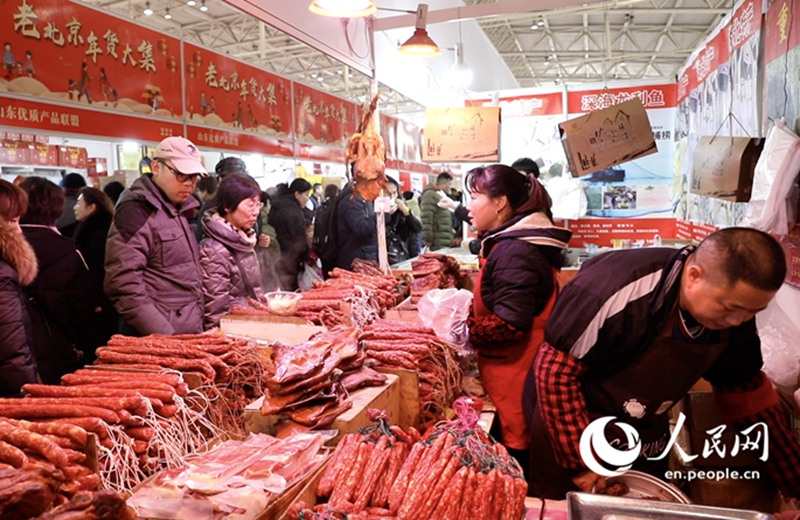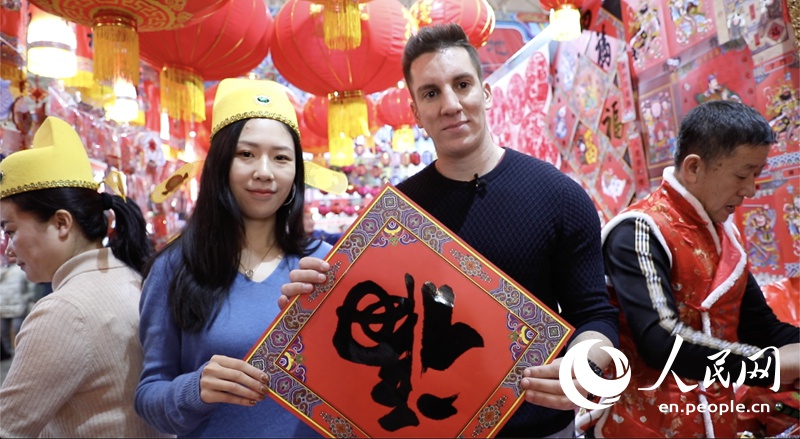

As with Christmas, the Lunar New Year holidays are essentially a time of thankfulness — of festive family reunions and get-togethers with one’s dearest relatives and friends. And as with the Christmas season run-up to the big day, the period leading up to the first day of the Lunar New Year brims with warm, gleeful feelings and excited anticipation.
A cherished cultural centerpiece of these lead-in weeks is the joy of heading to busy and colorful New Year markets to stock up on nianhuo, literally “New Year goods,” meaning all the goodies, decorations, and other traditional items that fill homes with auspicious symbolism. There’s an impressive amount of stocking up to do, for during the long holidays there is near constant feasting and entertaining. Most food and snack items are bought beforehand, because most retail operators shut down operations, at least for the first few days of the holiday.
Another cherished cultural centerpiece that gives rise to wide-ranging shopping needs prior to the Lunar New Year’s Day is the concept chu jiu bu xin, or “driving out the old and bringing in the new.” Households are cleaned spic-and-span beforehand, debts are settled, etc. New items, particularly clothing, are purchased, and the tradition is to wear new apparel when the new year arrives. The idea is to dispel any ill-fortune to make room for a new beginning.

People select food for the upcoming Spring Festival at the National Agricultural Exhibition Center in Beijing, on Jan 10, 2020. [Photo by Liu Ning/People´s Daily Online]
The more visually florid and aurally raucous the better — this applies to the New Year markets as well, which see great seas of happy people, who come for necessities but also to enjoy the carnivallike hubbub. As you might know, the most auspicious color in Chinese culture is red, and you’ll see it everywhere, from the decorative lanterns festooning the streets to the colors of the necessities themselves.
People will go for New Year shopping for new clothes, gifts for relatives, foods, snacks, nuts, spring couplets, lanterns, many decoration things to put in the house and mainly everything they will need for Chinese New Year Festival. Just like it is in the west, when it’s approaching Chinese New Year time there is a commercial sale festival.
Sweets, as one might expect, are a favorite New Year treat, especially with youngsters. An old-time rhyming expression goes chi tian tian, zhuan da qian, literally “eat sweet after sweet, make big money.” The expression’s tian tian, meaning “sweet upon sweet,” is a homonym for “day by day”.
In Chinese, the words for “cake” and “high” are both pronounced gao, and thus various traditional baked items are required nianhuo purchases. One is a sweetened sticky-rice cake called nian gao, literally “New Year cake,” which represents the auspicious expression nian nian gao sheng, meaning “year by year ever higher.”

Other foods with a very strong symbolism are: round dumplings, which signify family reunion as most families spend New Year's Eve together preparing them before eating them at midnight. They also represent prosperity because their shape resembles ancient Chinese money; spring rolls and egg rolls symbolize wealth because their shape is similar to gold bars. The word for fish, "yu," sounds like the Chinese words for both "wish" and "abundance." As a result, it's customary to serve a fish at the end of the New Year's evening meal, symbolizing a wish for abundance in the coming year. Serving a whole chicken symbolizes wholeness and prosperity. Due to their extended length, noodles symbolize longevity, so it's of the utmost importance not to cut them.
As we can imagine, shopping at a New Year market it is not just about quality and price of the products, but more about symbolism. It is a tradition full of history and deep family roots, and an occasion when Chinese people show great happiness and excitement over the upcoming season of family reunions.
Nevertheless, old traditions have to survive in modern times. That is why most of the traders at the markets also offer their products on internet platforms and they also allow electronic payment in their stands. In a society where e-commerce and mobile phones seem to be a part of everyone´s life, the key to safeguard such the charming tradition of buying New Year goodies is to include new technology and trends into the ancient traditional New Year markets.

 Award-winning photos show poverty reduction achievements in NE China's Jilin province
Award-winning photos show poverty reduction achievements in NE China's Jilin province People dance to greet advent of New Year in Ameiqituo Town, Guizhou
People dance to greet advent of New Year in Ameiqituo Town, Guizhou Fire brigade in Shanghai holds group wedding
Fire brigade in Shanghai holds group wedding Tourists enjoy ice sculptures in Datan Town, north China
Tourists enjoy ice sculptures in Datan Town, north China Sunset scenery of Dayan Pagoda in Xi'an
Sunset scenery of Dayan Pagoda in Xi'an Tourists have fun at scenic spot in Nanlong Town, NW China
Tourists have fun at scenic spot in Nanlong Town, NW China Harbin attracts tourists by making best use of ice in winter
Harbin attracts tourists by making best use of ice in winter In pics: FIS Alpine Ski Women's World Cup Slalom
In pics: FIS Alpine Ski Women's World Cup Slalom Black-necked cranes rest at reservoir in Lhunzhub County, Lhasa
Black-necked cranes rest at reservoir in Lhunzhub County, Lhasa China's FAST telescope will be available to foreign scientists in April
China's FAST telescope will be available to foreign scientists in April